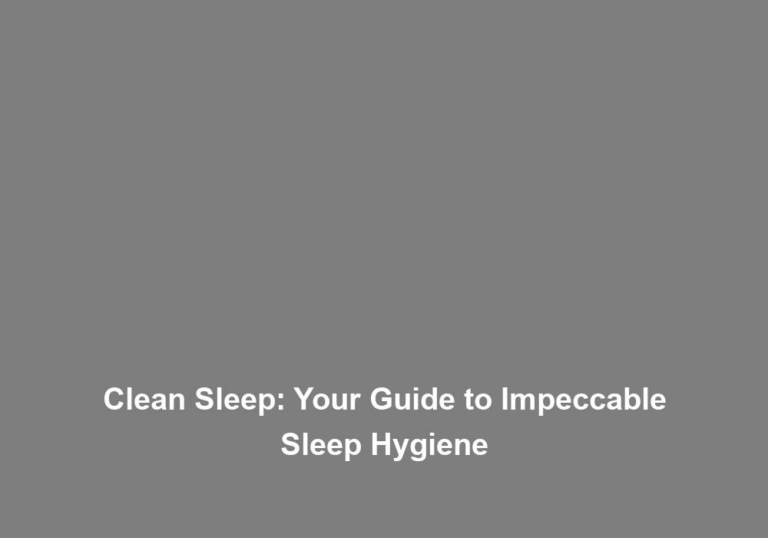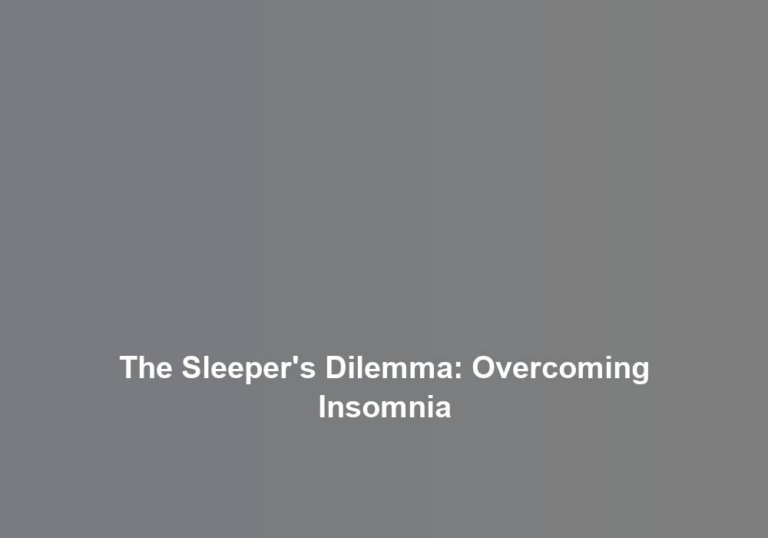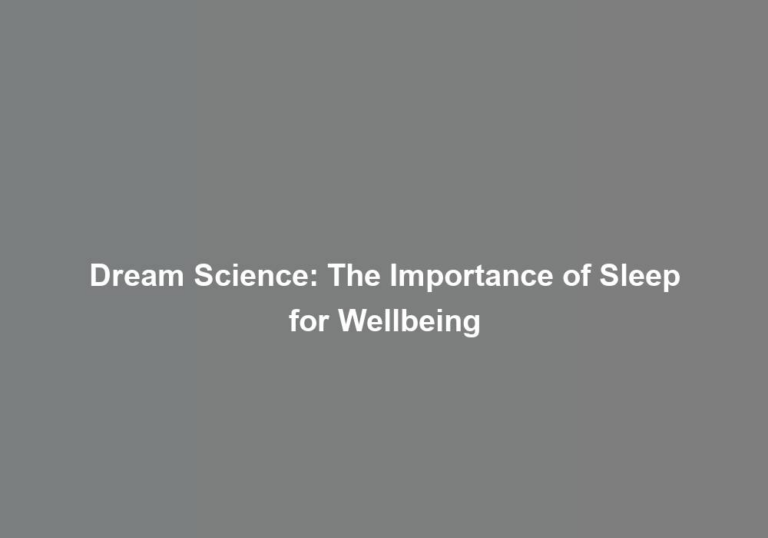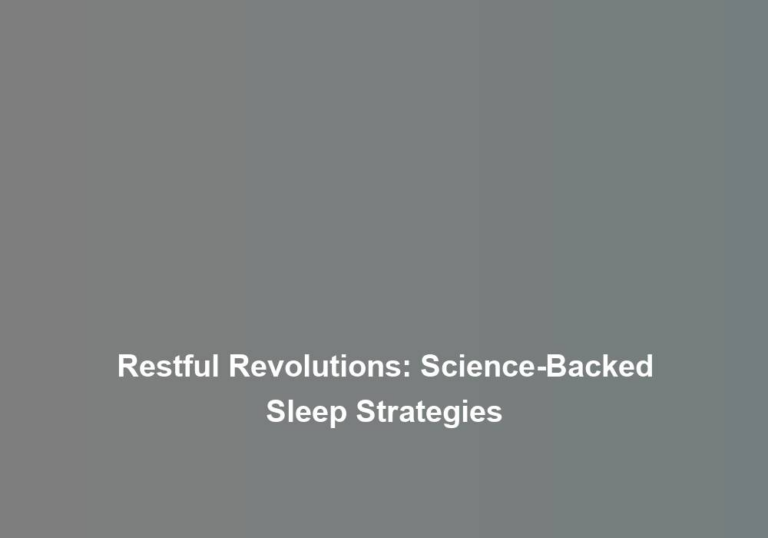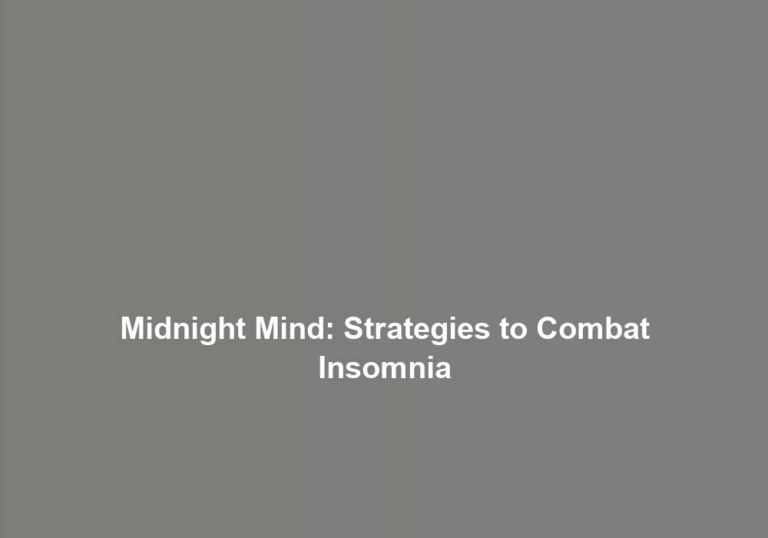Insomnia’s Antidote: Proven Sleep Science Methods
If youG??re one of the 30% of adults who experience symptoms of insomnia, youG??re not alone. The struggle to get a good nightG??s sleep can have a significant impact on your overall well-being and daily functioning. But what if there were proven sleep science methods that could provide relief from the grip of insomnia? By exploring the latest research and strategies in the field of sleep science, you can discover effective techniques to improve the quality of your sleep and reclaim your vitality.
Understanding InsomniaG??s Impact
Understanding the impact of insomnia on your health and well-being is crucial for implementing effective sleep management strategies. Sleep deprivation due to insomnia can have significant consequences on your physical and mental health. Research has consistently shown that inadequate sleep is linked to an increased risk of various health conditions, including heart disease, diabetes, obesity, and weakened immune function. Additionally, chronic insomnia can contribute to higher levels of stress, anxiety, and depression, further impacting your overall well-being.
Insomnia doesnG??t just affect your health; it also has a substantial impact on your productivity and daily functioning. When you struggle to obtain sufficient sleep, your cognitive abilities, concentration, and decision-making skills are compromised. This can lead to decreased productivity at work or school, as well as an increased risk of errors and accidents. Moreover, individuals with chronic insomnia often experience daytime drowsiness and fatigue, which can further hinder their performance and quality of life.
Recognizing the profound repercussions of insomnia on your health and productivity underscores the importance of addressing and managing this sleep disorder effectively. By understanding the detrimental effects of insomnia, you can appreciate the necessity of adopting evidence-based sleep science methods to improve your sleep quality and overall well-being.
The Science of Sleep Cycles
The detrimental effects of insomnia on your health and productivity underscore the necessity of exploring the science of sleep cycles, which plays a crucial role in understanding and improving your overall sleep quality. Understanding the intricacies of sleep stages and circadian rhythms can significantly impact your ability to achieve restorative sleep. HereG??s a breakdown of the science of sleep cycles:
-
Sleep Stages: Your sleep is divided into four stages, each with distinct brain wave patterns. Stage 1 is the lightest stage, where you transition from wakefulness to sleep. Stage 2 is a slightly deeper sleep, where your body temperature drops, and your heart rate slows. Stage 3 and 4 are deep sleep stages, crucial for physical restoration and growth.
-
Circadian Rhythms: Your bodyG??s internal clock, or circadian rhythm, regulates the timing of periods of wakefulness and sleepiness throughout the day. This natural cycle is influenced by external factors like light and temperature, and disruptions to it can lead to sleep disturbances.
Understanding the science of sleep cycles allows you to optimize your sleep patterns, ensuring that you experience the full range of restorative benefits that come with each sleep stage. By aligning your sleep schedule with your circadian rhythms, you can improve your overall sleep quality and wake up feeling more refreshed and rejuvenated.
Behavioral Techniques for Better Sleep
Improving your sleep quality can be achieved through behavioral techniques that promote healthy sleep habits and patterns. Incorporating relaxation techniques and maintaining good sleep hygiene are essential for better sleep. By incorporating these techniques into your routine, you can optimize your sleep environment and prepare your body and mind for restful sleep.
| Relaxation Techniques | Sleep Hygiene |
|---|---|
| Progressive muscle | Stick to a sleep schedule |
| relaxation | Create a bedtime routine |
| Deep breathing exercises | Limit daytime naps |
| Mindfulness meditation | Exercise regularly |
| Yoga | Avoid caffeine and |
| alcohol before bedtime |
Relaxation techniques such as progressive muscle relaxation, deep breathing exercises, mindfulness meditation, and yoga can help reduce stress and anxiety, making it easier to fall asleep. These techniques encourage relaxation and calmness, preparing your body for a restful nightG??s sleep.
In addition to relaxation techniques, practicing good sleep hygiene is crucial for improving sleep quality. Establishing a consistent sleep schedule, creating a calming bedtime routine, limiting daytime naps, exercising regularly, and avoiding caffeine and alcohol before bedtime can all contribute to better sleep. By incorporating these behavioral techniques into your daily routine, you can create an environment that supports healthy sleep patterns, ultimately leading to improved sleep quality and overall well-being.
The Role of Environment and Routine
Creating a conducive sleep environment and establishing a consistent routine are pivotal factors in optimizing your sleep quality and overall well-being. Environmental factors play a significant role in promoting better sleep. Consider the following to enhance your sleep environment:
-
Lighting: Dim the lights an hour before bedtime to signal to your body that itG??s time to wind down. Avoid exposure to bright screens, as they can interfere with your bodyG??s melatonin production, making it harder to fall asleep.
-
Temperature: Keep your bedroom cool, ideally between 60-67-?F (15-19-?C), as a cooler environment can help signal your body that itG??s time for sleep.
-
Clutter and Noise: Create a serene atmosphere by decluttering your sleeping space and using white noise machines or earplugs to minimize disruptive sounds.
-
Comfortable Bedding: Invest in a comfortable mattress and pillows that support your body and help you maintain a good sleeping posture.
In addition to environmental factors, bedtime rituals can significantly impact your sleep quality. Establishing a consistent pre-sleep routine, such as reading a book, taking a warm bath, or practicing relaxation exercises, can signal to your body that itG??s time to wind down and prepare for sleep. By incorporating these environmental adjustments and bedtime rituals into your routine, you can create an optimal sleep environment conducive to restful and restorative sleep.
Dietary and Lifestyle Adjustments
Consider incorporating dietary changes and lifestyle adjustments to further optimize your sleep quality and overall well-being. Nutritional supplements can play a significant role in improving sleep. For example, melatonin, a hormone that regulates sleep-wake cycles, is available as a supplement and has been shown to be effective in reducing the time it takes to fall asleep and improving overall sleep quality. Additionally, magnesium and calcium are minerals that are also linked to improved sleep quality. They help regulate muscle and nerve function, which can have a calming effect on the body and mind. However, itG??s important to consult with a healthcare professional before starting any new supplement regimen.
Relaxation techniques can also be beneficial for promoting better sleep. Practices such as meditation, deep breathing exercises, and progressive muscle relaxation can help calm the mind and body, making it easier to fall asleep and stay asleep. These techniques can be particularly useful for individuals who struggle with racing thoughts or anxiety at bedtime. Furthermore, incorporating lifestyle adjustments such as establishing a consistent sleep schedule, creating a relaxing bedtime routine, and avoiding stimulating activities before bed can also contribute to improved sleep quality.
Harnessing Technology for Quality Sleep
How can technology be harnessed to enhance the quality of your sleep? In todayG??s digital age, there are numerous ways in which technology can be utilized to improve your sleep patterns and overall well-being. By incorporating the use of sleep tracking and relaxation apps, you can effectively leverage technology to optimize your sleep experience.
-
Sleep Tracking: Utilize sleep tracking apps or devices that monitor your sleep patterns and provide insights into the duration and quality of your sleep. These tools can help you understand your sleep habits and make informed adjustments to improve your overall sleep quality.
-
Relaxation Apps: Explore the use of relaxation apps that offer guided meditation, soothing sounds, or breathing exercises to promote relaxation and reduce stress before bedtime. These apps can assist in calming your mind and body, creating an optimal environment for restful sleep.
-
Smart Lighting: Consider using smart lighting systems that allow you to customize your bedroom lighting according to your sleep schedule. Adjusting the brightness and color temperature of your lights can help signal your body for sleep or wakefulness at the appropriate times.
-
White Noise Machines: Explore the use of white noise machines or apps that can mask disruptive sounds and create a consistent ambient environment for sleep. These devices can aid in minimizing environmental disturbances that may interfere with your ability to fall and stay asleep.
Conclusion
In conclusion, by incorporating proven sleep science methods into your routine, you can unlock the key to a good nightG??s sleep. Just like a well-oiled machine, your body and mind can function at their best when you prioritize quality rest. With the right tools and strategies, you can break free from the grips of insomnia and embrace the rejuvenating power of a deep, peaceful slumber. ItG??s time to take control and reclaim your nights.


